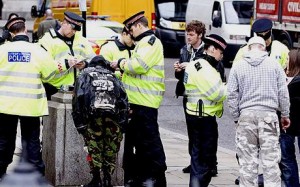
Quasi 2.300 ragazzi al di sotto di 16 anni sono stati fermati dalla polizia negli ultimi 12 mesi – una media di 6 al giorno, più del doppio rispetto all’anno precedente.
Tra di loro 27 bambini di 9 anni o meno. Il più giovane, in base alle cifre ottenute dal quotidiano, avrebbe appena tre anni.
Per gli esperti criminologi, l’enorme aumento di stop and search che coinvolgono bambini sottolinea un cambiamento nella politica della polizia, comunque la PSNI afferma che i poteri vengono usati “solo quando necessario”.
La PSNI non ha spiegato il motivo per l’incremento dei fermi, quindi non si sa se le perquisizioni possono essere legate ad un aumento dell’attività dei gruppi repubblicani oppure se è stato variato il modo in cui le cifre sono registrate.
Secondo i numeri rilasciati in base al Freedom of Information, 2.299 ragazzi sono stati fermati e perquisiti dalla polizia, contro i 1.066 dell’anno precedente.
L’età per la responsabilità, nel Regno Unito, è di 10 anni.
Il Commissario per l’Infanzia, Patricia Lewsley, intende scrivere al nuovo comandante della polizia Matt Baggott per assicurarsi che i giovani siano trattati in maniera appropriata.
“Riconosco possano esserci preoccupazioni sullo Stop and Search verso i giovani”, ha affermato.
“Solleverò l’argomento con il comandante della PSNI, compreso la necessità per i poliziotti di usare un metodo comprensibile ai bambini per spiegare le procedure di fermo e perquisizione”.
Paul O’Connor del Pat Finucane Centre, afferma che la PSNI potrebbe provocare un’alienazione nella nuova generazione, sovrautilizzando i propri poteri.
“E’ semplicemente una cosa difficile da credere. Non serve prendere una laurea per capire che si sta alienando un’intera nuova generazione attraverso l’estero uso dei poteri di fermo e perquisizione”, afferma O’Connor.
Stop & Search – la legge
Gli agenti possono fermare e perquisire un individuo o un veicolo in qualsiasi luogo pubblico se sono presenti ragionevoli sospetti che potranno trovare oggetti rubati o proibiti.
La Sezione 44 del Prevention of Terrorism Act 2000 permette il fermo delle persone qualora ritengano siano coinvolti in attività terroriste.
Durante il 2008/09 ci sono state aoltre 18.000 stop and search usando il PACE in Nordirlanda, e gli ultimi numeri segnano un inctrmento dei fermi in base al Terrorism Act.
I poliziotti hanno usati questi poteri speciali 2.488 volte nell’ultimo quadrimestre del 2008, il 245% in più dello stesso perdiodo del 2007.
Lo Human Rights Committee (Comitato per i Diritti Umani) del Policing Board valuta l’uso dei poteri di Stop and Search da parte della PSNI.
Police search three-year-old child
Almost 2,300 under-16s have been stopped by police in the last 12 months — an average of six every day and more than double the previous year’s figures.
That includes 27 who were aged nine and under. The youngest was just three years old, according to figures obtained by this newspaper.
Criminal experts said the huge rise in stop and searches involving children pointed to a change in policy by police, however the PSNI insisted the powers were used “only when necessary”.
The PSNI would not be drawn on its reason for the increase so it is not known if the searches could be related to a rise in dissident activity or a change in the way such figures are recorded.
According to figures released under Freedom of Information, some 2,299 under-16s were stopped and searched by the PSNI during 2008/09. That is more than double the 1,066 stop and searches carried out in the previous 12 months.
The age of criminal responsibility in UK law is 10.
Children’s Commissioner Patricia Lewsley said she intends to write to the new Chief Constable Matt Baggott to ensure that young people were treated appropriately.
“I recognise the potential for concern around the issue of young people being stopped and searched,” she said.
“I will be raising the matter with the Chief Constable, including the need for the PSNI to use child-friendly ways of explaining stop and search procedures to young people.”
Paul O’Connor from the Pat Finucane Centre said the PSNI was in danger of alienating a new generation of people by over-using its powers.
“This simply beggars belief. It doesn’t take a PhD to realise that you are going to alienate an entirely new generation through the rampant use of stop and search powers,” he said.
Stop and search – the law
Officers can stop and search an individual or vehicle in any public place if they have reasonable grounds to suspect they will find stolen or prohibited articles.
Section 44 of the Prevention of Terrorism Act 2000 also allows stop and search if officers have a reasonable suspicion people may be involved in terrorist activity.
During 2008/09 there were in excess of 18,000 stop and searches using PACE legislation in Northern Ireland, and recent figures also show a marked increase in the use of stop and search under the Terrorism Act.
Police used special powers 2,488 times in the last quarter of 2008, 245% up on the same period in 2007.
The Policing Board’s Human Rights Committee scrutinises the PSNI’s use of stop and search powers.